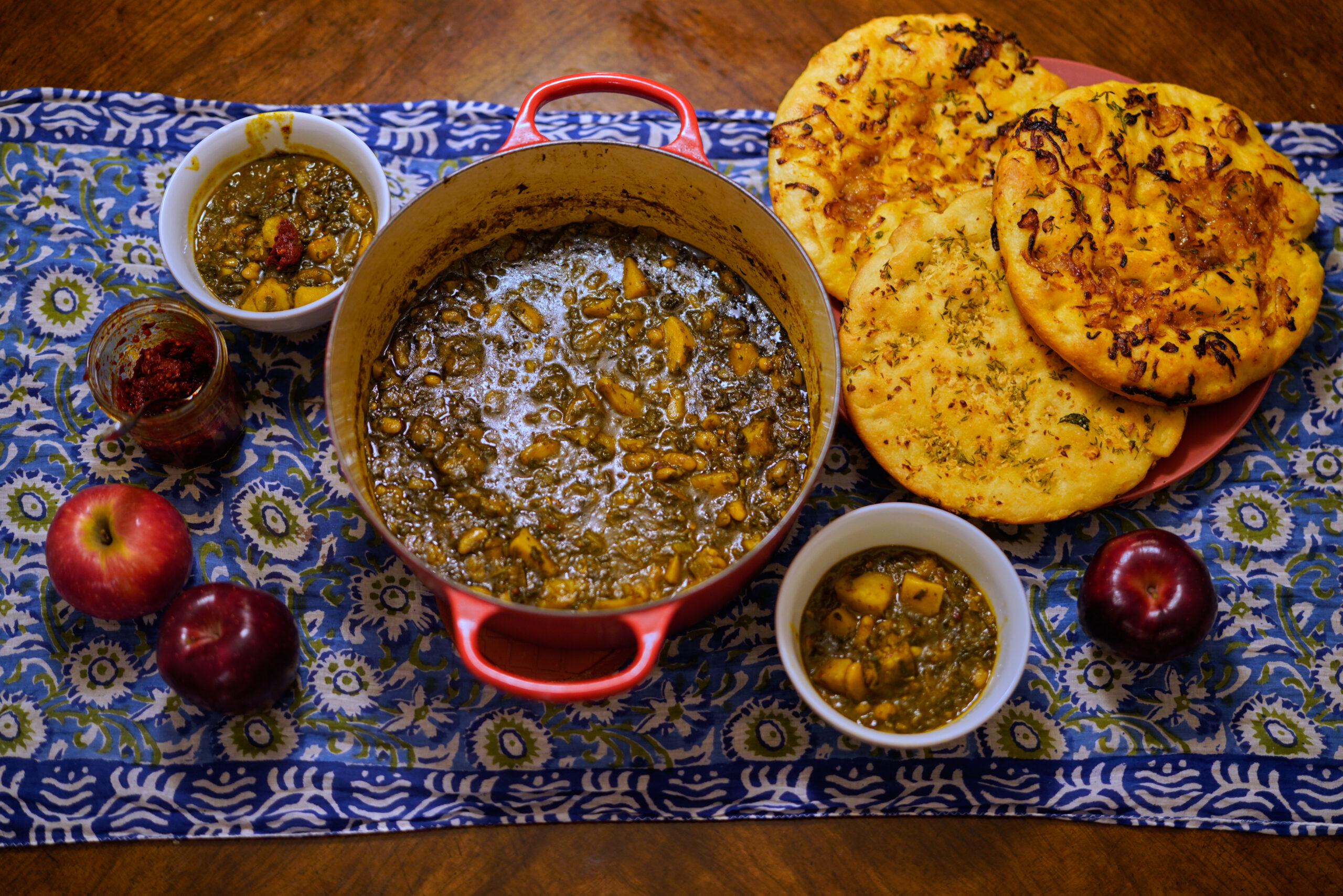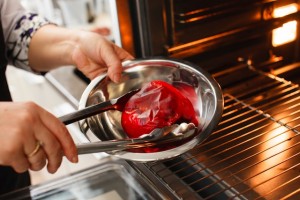The synagogue is the only place I see my grandmother sit still. We are positioned in the balcony together, behind a curtain, gazing down onto the wrapped bodies of men. Vigorously turning pages, they bow, move, and pray, standing as close to each other as they stand to the Torah placed in the center of the room and dressed in white to celebrate the new year. My grandmother’s legs are crossed. It’s strange to see her hands, usually in a frenzy, resting upon the closed prayer book.
I grew up in the United States, but during the summers and holidays I spent at my grandparent’s small hot apartment in Ramla, Israel, my grandma was always busy cooking. Even when it was 100 degrees outside, she’d be chopping, grinding, kneading, and frying. She is always prepared to host, welcome, accommodate, and sustain, adorning the coffee table with pizza and fresh fruit and the kitchen table with rice and stews. A cake for this, a hot sauce for that, couscous every Shabbat.
Like many religious Sephardic and Mizrachi women, my Savta found power in the kitchen. The men in my family had voices elsewhere; they went to the synagogue on a regular basis, they studied, they influenced the organization of communal life, and unlike the women, scarce in number and whispering from the balcony, the men prayed out loud.
My Savta prays through her cooking instead. Nurturing us with soup, she prays for the health of her family. Protecting us from harm and evil, she infuses her recipes with peppers, garlic, and unusual herbs. Bringing us together, marking time, and making meaning, she makes special dishes for celebration as well as commemoration, profoundly understanding exactly how others need to be fed.
After synagogue, we gather around the table to take part in the traditional Sephardic Rosh Hashanah seder. Prayers that connect symbolically with seasonal foods. And like most Sephardic Jews, we have our own specialized family customs.
My uncle reads:
יְהִי רָצוֹן מִלְּפָנֶיךָ ה’ אֱלֹהינוּ וֵאלֵֹהי אֲבוֹתֵינוּ, שֶׁתִּקְרַע רוֹעַ גְּזַר דִּינֵנוּ, וְיִקָּרְאוּ לְפָנֶיךָ זָכִיּוֹתֵינוּ
(May it be Your will, God, to tear away all evil decrees against us.)
And we laugh, and chat, and eat my grandma’s thinly sliced, breaded, and slightly sweet fried pumpkin.
יְהִי רָצוֹן מִלְּפָנֶיךָ ה’ אֱלֹהינוּ וֵאלֵֹהי אֲבוֹתֵינוּ, שֶׁיִּרְבּוּ זָכִיּוֹתֵינוּ וּתְלַבְּבֵנוּ
(May it be Your will, God, that our merits increase.)
And we toss crunchy, delicious, homemade sesame candies at each other.
Both of my grandparents were born and raised in Tunisia before moving to Israel. Prior to Tunisia, their families lived in Spain, Italy, and Algeria. We have fled, moved, adjusted, regrouped, influenced, and been influenced. From the stories we tell to the melodies we sing, to the rituals we practice, our customs and traditions reflect the cultures and places we have moved through on an endless search for safety and home.
And yet, wherever we go, and no matter how our stories change, we pray. Especially on the High holidays, in synagogues and sanctuaries, we yearn for a better future, confront mortality, and confess communal and personal sin. We take what we know, the traditions we have, and the things we pick up along the way, and we reach towards eternal concepts we can never totally catch, hold, or grasp with our hands. On Yom Kippur, we fast to make room for prayer. And although we pray, we always end up so much hungrier by the end of the day.
But sitting around the Rosh Hashanah table, our profound prayers have flavor. The taste of my grandmother’s cooking exposes the collective pain and perseverance of a people displaced: spices and textures from around the world meeting, celebrating, and longing together in a single dish. Around the table, enveloped by the tangible smells of a new year, we can taste our complicated and profound Jewish journey. And yet, we leave the sanctuary of the kitchen full.
As you get ready for this Rosh Hashanah, remember that prayer can go beyond words and consider what makes you feel full and what makes you feel at home.
For me, one of those things is a Tunisian Jewish slow-cooked stew called t’fina pkaila. T’finah style stews are prepared on Friday night before sunset leading into Shabbat because fires can not be lit on the Sabbath. These stews then slow cook and simmer in a preheated oven or hot plate until consumed. In other words, a “set-and-forget” type dish.
T’fina pkaila (scroll down for the recipe and more photos) specifically is a blackened spinach stew traditionally prepared for the New Year. Not only does the Talmud encourage eating spinach on holidays, spinach (or beet greens or chard) is one of the foods consumed during the Rosh Hashanah seder. Selek, which means beets in Hebrew, resembles the word retreat, yistalku. Before we eat beet greens or in their place spinach at the seder we pray that God may cause our enemies to retreat so that we can continue down a path of freedom.
T’fina pkaila is no simple spinach salad. The leaves are carefully and deliberately tended to, fried, and blackened slowly. The spinach takes on a complex and rich flavor profile while releasing color and juice into the oil used to slow cook the rest of the stew. Different North African Jewish and Muslim communities cook dishes that resemble t’fina pkaila, but Tunisian Jews use certain processes and ingredients that make this stew unique. Every Tunisian family has a “right” or “best” method to prepare the dish. Based on my grandmother’s recipe, documented and experimented with by my uncle in Jerusalem, and vegetarianized by me in America, this version reflects the Jewish journey of my own family. Enjoy and be full.
T’fina Pkaila
Ingredients:
1 ½ cup cannellini beans
½ -1 cup dried porcini mushrooms*
1 cup olive oil, divided
1 pound spinach
2 onions, diced
2 tbsp cumin
2 tbsp coriander
2 tsp paprika
1 tsp turmeric
½ heaping tsp cinnamon
4 garlic cloves
2 tbsp thyme
1 cup fresh Mint
1 ½ cup fresh cilantro
2-4 heaping tbsp harissa
4-5 Potatoes cut into large cubes
5 cups water and 3-4 tbsp consomme or other stock seasonings (or 5 cups vegetable stock)
Preparation:
-
- Place 1 ½ cup cannellini beans in a large bowl. Completely submerge in water and leave to soak overnight or at least 5 hours
- Cover dried porcini mushrooms with boiling water and let soak for at least 20 minutes. Once rehydrated, remove porcini mushrooms from water, dry, chop, and set aside
- Preheat oven to 300 degrees
- In an oven safe pot**, heat ½ cup of olive oil on a medium heat for several minutes until oil starts releasing smoke
 Add 1 pound of spinach and stir to coat with oil. Spinach will be overflowing from the pot but within minutes it will shrink down
Add 1 pound of spinach and stir to coat with oil. Spinach will be overflowing from the pot but within minutes it will shrink down- Let spinach simmer and fry in the oil for about 35 min. Add ¼ cup olive oil after 10 min and another ¼ cup olive oil after 20 min. Stir often, scraping any spinach from the bottom of the pan. As the spinach slowly blackens, the oil should become a dark green color. If after 35 min the spinach still has moisture and color, continue cooking until it is completely blackened, and the oil is dark green
- Continue heating the oil and remove blackened spinach from the pot. Set aside
- Add two diced onions to the green oil and sauté for several minutes until onions start becoming translucent
 Add back the blackened spinach. Also add, cumin, coriander, paprika, turmeric cinnamon, garlic, thyme, mint, cilantro, harissa, soaked beans, potatoes, and re-hydrated porcini mushrooms. Mixed until combined
Add back the blackened spinach. Also add, cumin, coriander, paprika, turmeric cinnamon, garlic, thyme, mint, cilantro, harissa, soaked beans, potatoes, and re-hydrated porcini mushrooms. Mixed until combined- Add 5 cups of water and 3 tbsp consomme or other stock seasoning. Can also substitute with 5 cups of vegetable stock, or water flavored with salt and pepper to taste. Bring to a simmer
- Place in the preheated oven and cook for 1 ½ hours to 2 hours. Pkaila is a forgiving stew once it’s simmering.
 You can cook it at a lower temperature for longer or leave it in at a low temperature to keep warm after it is cooked through
You can cook it at a lower temperature for longer or leave it in at a low temperature to keep warm after it is cooked through - Remove from the oven when ready. Serve with bread and more harissa or as a part of a greater Rosh Hashanah feast.
* Pkaila is traditionally a lamb or beef stew. I added porcini mushrooms for a meaty depth of flavor but you could add whatever you want to try and achieve the same effect. For example, homemade seitan or other store-bought plant based meats (that probably don’t exist in Ramla or Tunisia).
** If you don’t have an oven safe pot like a dutch oven, you can also simmer the stew on the stove for a few hours, checking periodically to see if potatoes and beans are ready. Results may vary. [vc_row][vc_column]








